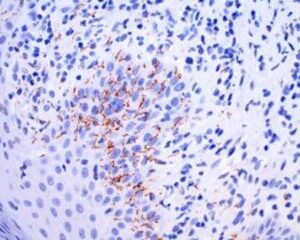Treponema pallidum is a species of spirochaete bacterium with subspecies that cause treponemal diseases such as syphilis, bejel, pinta and yaws. It is not seen on a Gram stained smear because the organism has a waxy coat around it that does not accept the Gram stain. Treponema pallidum is a Gram-negative spirochaete bacterium with periplasmic flagella. There are at least five subspecies of T. pallidum, including T. pallidum pallidum (the cause of syphilis), T. pallidum pertenue (the cause of yaws), T. pallidum carateum (the cause of pinta), T. pallidum trirocllium (the cause of syphilis and pinta) and T. pallidum endemicum (the cause of bejel). T. pallidum is motile and is generally transmitted through close sexual contact, entering the host via breaches in squamous or columnar epithelium. The microbe can also be transferred to a fetus by transplacental passage during the later stages of pregnancy, causing congenital syphilis. T. pallidum has one of the shortest bacterial genomes at only 1.14 million base pairs and has limited metabolic capabilities, reflecting its adaptation through genome reduction to the complex environment of mammalian tissue.
Catalog No. RC0104
Clone
Polyclonal
Isotype
IgG
Host species
Rabbit
Species Reactivity
Treponema pallidum
Cellular Localization
Treponema pallidum
Positive Control
Treponema pallidum infected tissue
Applications
ELISA, IHC, WB
Intended Use
Research Use Only

